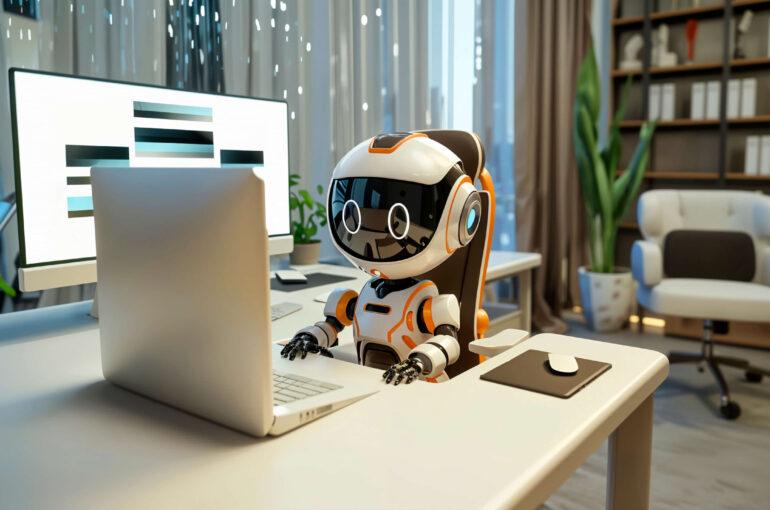Leveraging AI in Web Development
Leveraging AI in Web Development

Technology is a fast-paced, ever-evolving landscape, and AI has appeared as a true game-changer, and the rapid growth of AI is evidence of that. It is reshaping industries and pushing the boundaries of innovation. Web development is one of the fields where AI is making remarkable development. AI is transforming the development processes and improving the usability of the websites and apps that are created.
With technologies that automate code production and provide individualized user experiences, the web development industry is changing due to the rapid evolution of artificial intelligence (AI). This shift opens up new possibilities for innovation, scalability, and performance for web developers and businesses alike, going beyond efficiency.
AI in web development can significantly improve the abilities and productivity of creating a proper app and website. AI’s usage can give access to tools and methods that can enhance both the development process and the end-user experience.
AI in web development: The current landscape
AI can handle and maintain large datasets, recognize patterns, and automate decision-making processes in a way that is revolutionizing web development. These abilities model and shape the way websites are created and maintained. Web developers are often occupied with mundane chores that are primarily repetitive and time-consuming, such as code generation, testing, and debugging. AI gives developers the leverage to focus on more strategic, creative, and complex aspects of the development process by automating those dreadful and time-consuming processes. This change not only speeds up development but also improves the standard and creativity of websites.
AI makes it possible for websites to provide dynamic, customized user interactions according to user preferences in user experience (UX) design, enhancing user engagement and satisfaction.
However, automation is not the only credibility of AI. In order to consistently improve the performance of the website, the primary focus is on the valuable insights obtained from the user experience.
AI is able to predict user demands, speed up navigation, and recommend layout modifications based on patterns of user activity. Higher engagement and improved business outcomes are the results of this degree of optimization.
Automated Code Generation and Suggestions
AI tools that analyze the developer’s current code and recommend relevant snippets, functions, or even entire blocks of code, such as GitHub Copilot or Tabnine, can help in code generation. As a result, the development process is accelerated, and less boilerplate code is written. By using AI to manage repetitive coding processes, developers can concentrate on more important features and innovative solutions.
Automated Testing
Additionally, AI can be helpful in automating the testing process. Machine learning is used by tools like Testim to identify UI changes and modify test scripts appropriately, guaranteeing more thorough and dependable testing. In order to help developers prioritize which sections of the code require comprehensive testing and to minimize human error, AI can anticipate which parts of the website are more likely to experience problems. Additionally, AI-driven testing tools gain knowledge from past test outcomes, which gradually enhances their capacity to identify errors.
Real-Time Debugging
Debugging tools with AI features, like DeepCode, examine code to find and recommend patches for errors, security flaws, or performance snags. Thus providing solutions for security vulnerabilities. These tools can provide more precise insights than conventional debugging techniques since they are constantly learning from large codebases. Debugging can be automated to help developers fix problems more quickly and guarantee that the website functions without any delays.
Predictive Maintenance
AI can help developers to prevent and measure any issue by predicting when problems are likely to occur. It can identify early warning indicators of issues, such as traffic surges that could cause crashes or vulnerabilities that could be exploited, by continuously analyzing user behavior and system performance. AI lowers downtime and improves website reliability and security by automating maintenance operations like software updates and security patches.
Personalized User Experiences
By processing the data gathered from the users based on their behavior, AI automatically customizes layouts, content, and recommendations and can, for example, promote products or services that are specific to each user, just as e-commerce websites like Amazon or Netflix do by using user history. Higher engagement and conversion rates result from this degree of customization, which also improves customer pleasure.
Design and Layout Automation
AI-powered design tools may automatically generate attractive layouts by choosing the best design components according to user tastes or content. Because of this, manual design is no longer necessary, and web development is more efficient while still enabling functional and aesthetic customization. In some cases, tools like Wix ADI or Bookmark eliminate the need for professional designers to use AI to create whole websites from user input.
Improved Decision-Making
AI can assist in making data-driven decisions at every stage of the development process. AI can be used to drive the optimization of features, design, and content by analyzing patterns in user interactions, browsing behavior, or even feedback. Developers can prioritize high-impact tasks by using AI models to predict what type of change will increase user retention, conversion rates, or overall pleasure.
Streamlined Workflow and Collaboration
Machine learning is used by AI-powered project management platforms like Monday.com and Asana to monitor progress, spot challenges, and provide recommendations for streamlining processes. By estimating the amount of time required for activities, allocating the appropriate resources, and automating scheduling, these solutions can facilitate more effective collaboration across web development teams. This lowers administrative stress and boosts productivity.
Performance and Security Optimization
AI keeps a close eye on website performance, examining variables like traffic variations, server responsiveness, and page load time. AI can recommend enhancements, including caching techniques or content delivery changes, to speed up the website if performance deteriorates. AI-powered security systems also identify irregularities or possible security breaches, offering early alerts and action recommendations for reducing risks.
Leveraging AI in Web Development
AI is quickly changing the web development industry by providing creative solutions that improve user experiences, boost site speed, and speed up procedures. AI is changing how developers approach online projects, from automating repetitive activities to producing dynamic, personalized websites. Here are some ways AI is impacting the sector:
Automation and Efficiency
AI is empowering developers to automate time-consuming tasks such as code generation, testing, and debugging. By using AI-powered tools like GitHub Copilot and automated testing frameworks, developers can reduce manual effort, eliminate human errors, and expedite the development process. These tools not only save time but also enhance the accuracy and consistency of the code, leading to faster and more reliable website builds.
Personalized User Experiences
One of the most significant impacts of AI in web development is its ability to provide personalized experiences. Through machine learning algorithms, websites can analyze user behavior and deliver tailored content, recommendations, and interactions in real time. AI-powered recommendation engines, like those used by Netflix and Amazon, can significantly enhance user engagement, boosting conversion rates and customer satisfaction.
AI-powered chatbots and Virtual Assistants
Integrating AI-driven chatbots into websites is becoming increasingly common. These virtual assistants provide real-time customer support, answer questions, and guide users through complex processes. By offering 24/7 assistance, AI chatbots improve user experience, reduce bounce rates, and free up human staff to focus on more critical tasks.
Predictive Analytics and Data Insights
AI enables the analysis of large datasets to predict trends, behaviors, and potential issues. For example, AI can be used to monitor website performance, identify areas of improvement, and expect traffic spikes. Predictive analytics helps businesses optimize their websites for better performance and prepare for future needs. In e-commerce, AI can predict customer preferences and even anticipate purchasing trends, enhancing the overall shopping experience.
Enhanced Security with AI
Security is a top priority for any website, and AI plays a crucial role in safeguarding data. AI can detect unusual activity, analyze patterns, and identify potential threats before they cause harm. In real-time, AI can detect fraudulent transactions, prevent hacking attempts, and bolster site security, providing peace of mind for both developers and users.
Content Creation and Management
AI is also transforming how websites handle content. Modern CMS platforms powered by AI can assist in generating SEO-friendly content, suggesting keywords, and even automating the scheduling and publishing of posts. With AI, content management becomes more efficient, saving time and helping businesses maintain a steady flow of relevant, optimized content
.
Challenges and the Future of AI in Web Development
Despite its many advantages, AI in web development presents some challenges, including data privacy concerns, ethical considerations, and the potential for bias in AI algorithms. Developers must ensure they are using AI responsibly, with complete transparency and compliance with privacy regulations.
Looking to the future, AI will continue to shape the web development landscape. As technologies evolve, we can expect even more advanced AI tools that will help developers create more intelligent, more interactive, and user-centric websites. Developers who embrace AI will have a competitive edge, staying ahead of trends and creating next-level web experiences.
Conclusion
AI’s incredible ability to evaluate massive datasets, identify patterns, and automate decision-making greatly enhanced the web development processes. AI allows developers to concentrate on more creative, strategic aspects of the development process by taking over repetitive chores like code generation, testing, and debugging. Websites may be created faster, more effectively, and with better quality as a result, and AI’s constant learning and adaptability guarantee that web development will keep up with user and corporate demands.



